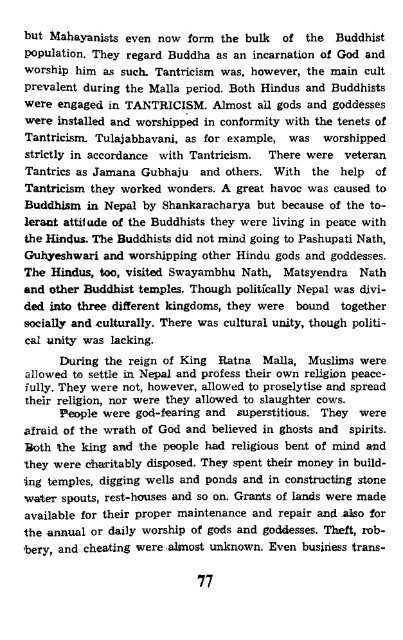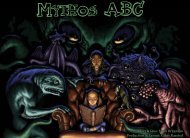You also want an ePaper? Increase the reach of your titles
YUMPU automatically turns print PDFs into web optimized ePapers that Google loves.
ut Mahayanists even now form the bulk of the Buddhist<br />
population. They regard Buddha as an incarnation of God and<br />
worship him as such. Tantricism was, however, the main cult<br />
prevalent during the Malla period. Both Hindus and Buddhists<br />
were engaged in TANTRICISM. Almost ail gods and goddesses<br />
were installed and worshipped in conformity with the tenets of<br />
Tantricism, Tulajabhavani, as for example, was worshipped<br />
strictly in accordance with Tantricism. There were veteran<br />
Tantrics as Jamana Gubhaju and others. With the help of<br />
Tantricism they worked wonders. A great havoc was caused to<br />
Buddhism in <strong>Nepal</strong> by Shankaracharya but because of the to<br />
lerant attitude of the Buddhists they were living in peace with<br />
the Hindus. The Buddhists did not mind going to Pashupati Nath,<br />
Guhyeshwari and worshipping other Hindu gods and goddesses.<br />
The Hindus, too, visited Swayambhu Nath, Matsyendra Nath<br />
and other Buddhist temples. Though politically <strong>Nepal</strong> was divi<br />
ded into three different kingdoms, they were bound together<br />
socially and culturally. There was cultural unity, though politi<br />
cal unity was lacking.<br />
During the reign of King Ratna Malla, Muslims were<br />
allowed to settle in <strong>Nepal</strong> and profess their own religion peace<br />
fully. They were not, however, allowed to proselytise and spread<br />
their religion, nor were they allowed to slaughter cows.<br />
People were god-fearing and superstitious. They were<br />
afraid of the wrath of God and believed in ghosts and<br />
spirits.<br />
Both the king and the people had religious bent of mind and<br />
they were charitably disposed. They spent their money in build<br />
ing temples, digging -wells and ponds and in constructing stone<br />
water spouts, rest-houses and so on. Grants of lands were made<br />
available for their proper maintenance and repair and -also for<br />
the annual or daily worship of gods and goddesses. Theft, robbery,<br />
and cheating were almost unknown. Even business trans-<br />
77




